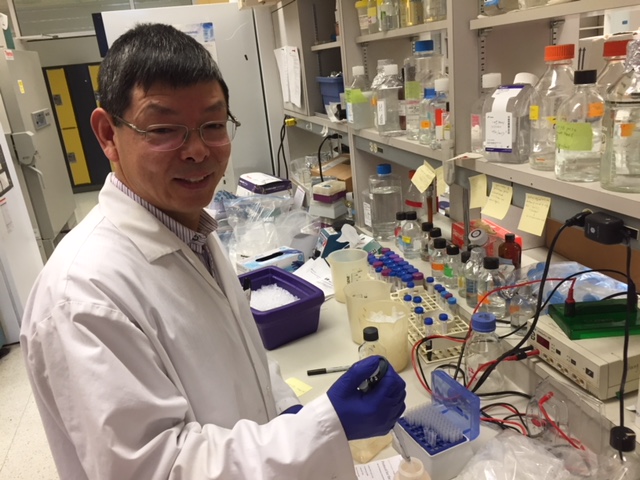
Dawei Zhang, associate professor in the Department of Pediatrics, is one of 30 UAlberta researchers sharing $19.2 million in 2018 CIHR project grants.
Current cardiovascular disease treatments use statins to lower levels of LDL (bad) cholesterol in the blood and reduce strokes and heart attacks by 20 to 40 per cent. While this treatment is effective, Dawei Zhang explains how he and his team are working to find even better ways to tackle the problem.
What is your research project focused on?
We're taking a new approach to reducing LDL cholesterol in the blood. We all have these proteins in our body, called LDL receptors, that are nature's way of clearing out bad cholesterol. We recently discovered that another protein in the body (MMP14) interferes with the LDL receptors doing their job. If we can figure out how MMP14 interferes, that can lead to finding a way to block it and allow the body to clear the bad cholesterol more efficiently.
Did you suspect MMP14 was interfering, or was this a surprise discovery that led you to want to find out more?
A couple of years ago, we were working on PCSK9, a protein that is very "hot" in cardiovascular research right now. That is when we discovered that this one, MMP14, was interfering with the LDL receptors. We thought, 'This is interesting, maybe this has potential to be a new therapeutic target to work on?'
Nobody had reported this function of MMP14 before and it's a really lower function of the protein that we were not looking at specifically, so that's why we found it by accident.
My lab works on finding ways to reduce bad cholesterol more efficiently―that's all we do. We start from one point, but we always follow the experiment path when we find something new. And we go after that, if we can.
How important is getting CIHR funding to reaching the goal of a new treatment for reducing LDL cholesterol?
We discovered this two years ago. After the discovery, I got partial funding from other sources to work on a different aspect of this protein but, unfortunately, we were not successful getting enough to proceed. Luckily, I got some bridge funding from the Faculty of Medicine & Dentistry here at the U of A to continue the project and this year I was successful with CIHR.
We never give up, but the project has moved very slowly because we've only had one graduate student to work on it. Now, with CIHR funding, it definitely will speed up the research.
How will this research help individuals avoid strokes and heart attacks?
Eventually, we will try to validate our findings in different lab models. This will verify the therapeutic potential of MMP14 to help us reduce the bad cholesterol that contributes to strokes and heart attacks in humans. I think we can find out within two to three years if this approach will help and then be able to move forward to the next step and start to develop treatment for people.
We think this approach is really promising. It is a novel finding and nobody reported it before, so it's really exciting.
Basic science can often seem so far away from impacting individuals, but you are showing a direct path...
Yes, the impact is why discovery research is so important. For pure basic researchers, you have to demonstrate connections to how important your research is, that your discovery today has potential as long as we keep going. We just discovered this by accident and then, eventually, this is leading the way to a future therapeutic to treat human patient's disease.
The value of Dawei Zhang's 2018 Canadian Institutes of Health Research project grant is $883,575 over five years. Watch for upcoming profiles of Department of Pediatrics researchers Jason Dyck and Richard Lehner, who also received project grants.